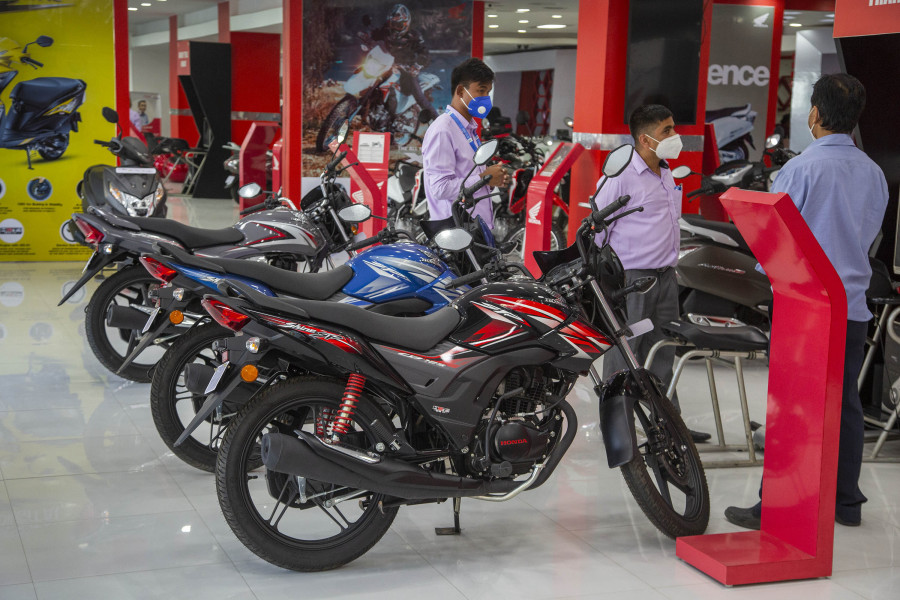Money
Driven by festive push, auto sales recovery continued into October-November
Some models of two-wheelers went out of stock due to explosive demand, dealers say.
Krishana Prasain
Festive season schemes and new launches led automobile dealers to see healthy sales for October and November. After recording zero sales during the four months of lockdown, March-end to July, sales finally started to pick up in the festive season that began in October, dealers said.
Amid pandemic, domestic automobile dealers said they are happy with the better-then-expected sales.
Krishna Dulal, president of Nepal Automobiles Dealers Association, said that overall sales declined 25 percent this festive season as compared to last year’s festive sales. “But despite that, it was indeed a good sales record given the difficult situation,” he said.
Auto sales were largely impacted due to the slowdown in the economy. A grinding four-month lockdown and continued restrictions to prevent the spread of coronavirus had shut down life and business in major cities of the countries, with millions of people losing their jobs or suffering pay cuts. Its impact was visible in the country’s automobile industry as well.
The Covid-19 pandemic also forced the postponement of the country’s largest automobile fair, which used to take place ahead of Dashain and recorded sales in billions of rupees. But things are starting to look up now, say dealers.
“The automobile market is now making a gradual recovery,” said Dulal.
Ramesh Danekhu, marketing and communications manager at Morang Auto Works, the authorised distributor of Yamaha two-wheelers as well as Skoda cars and Jeep in Nepal, said that the company was able to log sales record of two-wheelers as equal to last year’s festive sales.
“In terms of the four-wheelers segment, we were able to make 65 percent of sales in our premium segments, Jeep and Skoda,” he said. Most of the sales in the four-wheeler segment were from pending booking and enquiry before lockdown, he added. “But there were few new buyers for the luxury segment,” he added.
Automobile dealers said that the Kathmandu valley already had a weak public transportation system that has been boosting the sales for private vehicles.
This year, people feared to commute in public transportation because of the possibility of virus transmission and that helped sales to pick up despite the country’s crawling economic growth. The demand for two-wheelers observed aggressive sales growth, said domestic automobile dealers.
Automobile dealers came up with schemes and offers in two-wheelers as soon as the lockdown was lifted which helped in rising sales and the same continuity was seen in festival time, said Danekhu.
According to automobile dealers, some models of two-wheelers even went out of stock, as dealers were not expecting that much of sales during the pandemic. “Yamaha’s FZ model bike went out of stock,” said Danekhu.
However, the same cannot be said for scooters. The sales of scooters were on the rise for the last four years in two-wheelers contributing around 33 percent of sales till 2019. But this time, the growth momentum stopped, said automobile dealers.
Automobile market made better sales during Dashain and Tihar compared to the post-pandemic situation, said Rupesh Sharma Bhatta, general manager of Laxmi Intercontinental, the authorised distributor of Hyundai cars in Nepal.
Automobile sales were totally affected during the Nepali New Year because of the lockdown. The sales did not pick up even after the lockdown as people were waiting for right time and bumper offers.
“The festive season, however, boosted the sales to some extent,” said Bhatta, adding that it would take time for the automobile sector to recover fully. “The festive discounts offers also helped the sales this year.”
In terms of four-wheelers, people continued to prefer buying SUVs, said automobile dealers. According to Bhatta, Hyundai’s Creta, Venue and Grand i10 and Santro observed healthy sales during the festive season.
According to the Trade and Export Promotion Center, the country imported automobiles and parts worth Rs19.82 billion in the first three months of the current fiscal year, recording a decline of 27.5 percent compared to the same period in the last fiscal year.
The country imported 84,000 automobiles in the first three months of the current fiscal year. The country imported vehicles and parts worth Rs65 billion in the last fiscal year 2019-20 that ended mid-July.




 22.12°C Kathmandu
22.12°C Kathmandu













